In Focus This Week
Voting should fit your life, not disrupt it
Palm Beach County launches early voting appointment program
By M. Mindy Moretti
electionline.org
They say that the waiting is the hardest part and in Palm Beach County, Florida, where voting lines can reach a 3-hour wait time–in all sorts of weather–it can be particularly hard.

Photo courtesy of WPTV.
But thanks to an innovative early voting appointment program, voters in Palm Beach County don’t have to wait at all to cast their early ballots anymore.
In 2022 the county launched a first-in-the-nation early voting appointment program using No Wait Inside technology that became popular during the height of the pandemic. No Wait Inside is a virtual waiting room Cloud application.
The program allowed voters to make an appointment during a time window and at a location convenient for them, schedule an appointment online up to 30 days in advance, cancel the appointment at any time, receive text notifications about their upcoming appointment, and skip the line during their appointment window to vote quickly.
The program was made available to all voters regardless of their access to the internet, technology, or a mobile device. Voters can book an appointment via the county website but also over the phone with staff, in-person at any of the county elections offices, or at an Early Voting location.
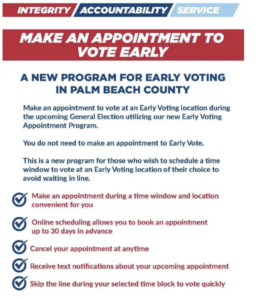 Appointments are 15-minute time windows where the voter can arrive at the polling location, skip the line, and vote at the time most convenient to them.
Appointments are 15-minute time windows where the voter can arrive at the polling location, skip the line, and vote at the time most convenient to them.
During its first roll-out in 2022, more than 21,000 early voters utilized the system.
“In 2022, we learned that appointment voting benefited a broad cross-section of voters — professionals, seniors, and those with mobility or time constraints,” explained Supervisor of Elections Wendy Sartory Link. “That insight shaped how we communicated the program’s value in 2024, focusing on how it meets real-life needs with flexibility and convenience.”
Usage nearly quintupled in 2024 compared to 2022. Several locations reached full appointment capacity during peak days. According to Sartory Link, voters embraced the opportunity to vote on their schedule, avoid lines, and skip unpredictable weather — especially during Florida’s storm season.
“Our appointment-based early voting system remained a standout success in 2024,” Sartory Link said. “We focused on expanding awareness and access, resulting in over 100,000 appointments made by voters across the county. Feedback has been overwhelmingly positive.
The benefits of the program include:
- Reduces long wait times;
- Minimizes voter scheduling conflicts;
- Mitigates weather-related disruptions (critical during hurricane season);
- Provides text reminders & flexible scheduling for voter convenience;
- Strengthens public trust and confidence in the voting process;
- Enables seamless mobile technology integration using QR codes & online scheduling; and
- Voter data is secure; deleted after completion of appointment
The cost depends on the number of locations and days of early voting. Key expenses include licensing fees, minimal hardware, and staffing. Each site needs a designated poll worker to oversee appointment check-ins, and all staff require brief training.
“The cost is modest relative to the gains realized from improved efficiencies and voter experience,” Sartory Link said.
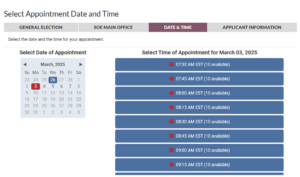 For those jurisdictions looking to implement their own appointment system, Sartory Link said they should assess their needs and explore available appointment-based tools — there are several vendors offering customizable options and Palm Beach moved to a new vendor after the launch. The key is finding a solution that integrates well with your workflow, is mobile-friendly, and doesn’t exclude voters without internet access. The Palm Beach system supports phone, in-person, and online scheduling.
For those jurisdictions looking to implement their own appointment system, Sartory Link said they should assess their needs and explore available appointment-based tools — there are several vendors offering customizable options and Palm Beach moved to a new vendor after the launch. The key is finding a solution that integrates well with your workflow, is mobile-friendly, and doesn’t exclude voters without internet access. The Palm Beach system supports phone, in-person, and online scheduling.
“This program is more than just a tech upgrade — it builds voter confidence, reduces wait times, and supports a smoother, more predictable voting experience,” Sartory Link said. “For us, it’s another way of saying: voting should fit your life, not disrupt it.”
(Palm Beach County’s Revolutionizing Early Voting with Appointments received the 2024 Democracy Award for Best Practices from the Election Center. The call for submissions for 2025 is now open.)
electionline Daily News Email
 What’s the best part of waking up? electionline Daily News in your inbox of course so be sure to sign up for your daily dose.
What’s the best part of waking up? electionline Daily News in your inbox of course so be sure to sign up for your daily dose.
Each morning you’ll receive the top headlines of the day, plus a listing of states featured in that day’s news round up.
To sign up, simply visit our site and provide us with your email and you’ll begin receiving the news in your inbox each morning.
We Google so you don’t have to!
Call for Papers and Proposals
 Professional Practice Papers: The Professional Practice Program is an opportunity to highlight excellence in election professionalism at the Election Center’s National Conference. The deadline for submissions is June 16, 2025 at 11:59pm ET. Any papers submitted after the deadline will not be considered. All materials submitted become the property of the Election Center and will be published on the Election Center website. Materials submitted will not be returned to entrants. Award winners will be determined using the PPP Selection and Processing Guide. The Election Center shall decide whether to present each award in any given year. Applicants need not designate a category.
Professional Practice Papers: The Professional Practice Program is an opportunity to highlight excellence in election professionalism at the Election Center’s National Conference. The deadline for submissions is June 16, 2025 at 11:59pm ET. Any papers submitted after the deadline will not be considered. All materials submitted become the property of the Election Center and will be published on the Election Center website. Materials submitted will not be returned to entrants. Award winners will be determined using the PPP Selection and Processing Guide. The Election Center shall decide whether to present each award in any given year. Applicants need not designate a category.
 Election Science Conference-within-a-Conference: The 2026 Election Science Conference-within-a-Conference (CwC), co-organized by Lisa Bryant (California State University, Fresno) and Joshua Ferrer (American University), is now open for proposal submissions. The CwC will be part of the Southern Political Science Association (SPSA) Annual Meeting, which will be held January 14-17, 2026 in New Orleans, Louisiana. The submission deadline is August 15, 2025. We hope to elicit broad participation from those focused on Election Law, Election Administration, Election Sciences, State and Local Politics, Voting and Voting Rights, Public Opinion, and Public Administration circles. For this CwC, we invite submissions in all areas of election sciences. We encourage submissions from all scholars, including practitioners, researchers in advocacy organizations, those from underrepresented backgrounds, graduate students, and early career scholars. Proposals can focus on the American electoral context, as well as the international or comparative electoral environments and systems. Possible topics include, but are not limited to: public opinion about elections, election administration and procedures, voter confidence, threats to election officials (and their implications), voter disenfranchisement, voting methods and voter experiences, racial/ethnic disparities in access to registration and voting, changes in election laws and election reform, elite rhetoric in how election results are processed and reported, voter turnout and behavior. The CwC will include approximately 10-12 panels of 4-5 papers each, with all panels likely occurring over 1.5 days for ease of attendance (exact dates and times to be announced later). Panel proposals or roundtable proposals are also welcome. If you are part of an organized panel, all papers should submit individually and indicate they are part of a panel. Per the conference organizers, please DO NOT SUBMIT TO THE SPSA CONFERENCE WEBSITE IF YOU ARE SUBMITTING TO THE CWC. This results in papers being double booked at the conference. Please don’t hesitate to reach out to us with any questions at: lbryant@csufresno.edu (Lisa Bryant) or jferrer2017@gmail.com (Joshua Ferrer).
Election Science Conference-within-a-Conference: The 2026 Election Science Conference-within-a-Conference (CwC), co-organized by Lisa Bryant (California State University, Fresno) and Joshua Ferrer (American University), is now open for proposal submissions. The CwC will be part of the Southern Political Science Association (SPSA) Annual Meeting, which will be held January 14-17, 2026 in New Orleans, Louisiana. The submission deadline is August 15, 2025. We hope to elicit broad participation from those focused on Election Law, Election Administration, Election Sciences, State and Local Politics, Voting and Voting Rights, Public Opinion, and Public Administration circles. For this CwC, we invite submissions in all areas of election sciences. We encourage submissions from all scholars, including practitioners, researchers in advocacy organizations, those from underrepresented backgrounds, graduate students, and early career scholars. Proposals can focus on the American electoral context, as well as the international or comparative electoral environments and systems. Possible topics include, but are not limited to: public opinion about elections, election administration and procedures, voter confidence, threats to election officials (and their implications), voter disenfranchisement, voting methods and voter experiences, racial/ethnic disparities in access to registration and voting, changes in election laws and election reform, elite rhetoric in how election results are processed and reported, voter turnout and behavior. The CwC will include approximately 10-12 panels of 4-5 papers each, with all panels likely occurring over 1.5 days for ease of attendance (exact dates and times to be announced later). Panel proposals or roundtable proposals are also welcome. If you are part of an organized panel, all papers should submit individually and indicate they are part of a panel. Per the conference organizers, please DO NOT SUBMIT TO THE SPSA CONFERENCE WEBSITE IF YOU ARE SUBMITTING TO THE CWC. This results in papers being double booked at the conference. Please don’t hesitate to reach out to us with any questions at: lbryant@csufresno.edu (Lisa Bryant) or jferrer2017@gmail.com (Joshua Ferrer).
Election News This Week
 Federal Update: The fiscal 2026 budget proposal President Donald Trump unveiled last week would make deep cuts to the Cybersecurity and Infrastructure Security Agency (CISA) workforce, with a goal of eliminating 1,083 positions and chopping its budget by $495 million, to $2.4 billion. The budget proposal includes the elimination of 14 election security positions. While there has been no official announcement, it appears that Maureen Riordan will be the new chief of the voting section at the Department of Justice. She is currently serving in that role on an interim basis. Riordan previously spent nearly 17 years as a lawyer at the voting section, according to her LinkedIn bio. But from 2021 until this month, she served as litigation counsel at the Public Interest Legal Foundation (PILF). The Republican National Committee (RNC) filed a motion this week to intervene in ongoing federal litigation against Trump’s executive order on voting. The motion places the RNC alongside the Trump administration in defending measures that would roll back mail-in voting, impose proof-of-citizenship requirements for voter registration and penalize states that don’t comply. “The RNC intervenes as a defendant in this case to vindicate its own rights and in a representational capacity to vindicate the rights of its members, affiliated voters, and candidates,” Michael Ambrosini, the RNC’s Chief of Staff, stated in a sworn declaration submitted with the motion. Ambrosini argued that expanded mail-in ballot access and insufficient voter roll maintenance harm Republican electoral prospects and drain critical party resources. One of its central claims is that mail ballots received after Election Day give Democrats a competitive edge. “Late-arriving ballots that skew heavily in favor of one party undermine confidence in the integrity of the election, dilute the timely votes of Republican voters, and harm the RNC,” the filing states.
Federal Update: The fiscal 2026 budget proposal President Donald Trump unveiled last week would make deep cuts to the Cybersecurity and Infrastructure Security Agency (CISA) workforce, with a goal of eliminating 1,083 positions and chopping its budget by $495 million, to $2.4 billion. The budget proposal includes the elimination of 14 election security positions. While there has been no official announcement, it appears that Maureen Riordan will be the new chief of the voting section at the Department of Justice. She is currently serving in that role on an interim basis. Riordan previously spent nearly 17 years as a lawyer at the voting section, according to her LinkedIn bio. But from 2021 until this month, she served as litigation counsel at the Public Interest Legal Foundation (PILF). The Republican National Committee (RNC) filed a motion this week to intervene in ongoing federal litigation against Trump’s executive order on voting. The motion places the RNC alongside the Trump administration in defending measures that would roll back mail-in voting, impose proof-of-citizenship requirements for voter registration and penalize states that don’t comply. “The RNC intervenes as a defendant in this case to vindicate its own rights and in a representational capacity to vindicate the rights of its members, affiliated voters, and candidates,” Michael Ambrosini, the RNC’s Chief of Staff, stated in a sworn declaration submitted with the motion. Ambrosini argued that expanded mail-in ballot access and insufficient voter roll maintenance harm Republican electoral prospects and drain critical party resources. One of its central claims is that mail ballots received after Election Day give Democrats a competitive edge. “Late-arriving ballots that skew heavily in favor of one party undermine confidence in the integrity of the election, dilute the timely votes of Republican voters, and harm the RNC,” the filing states.
 Missing Ballot Update: Remember those nearly 550 Vanderburgh County, Indiana mail-in absentee ballots that never showed up after last year’s election? Turns out it was only 296, according to newly uncovered state data. With the same Statewide Voter Registration System data also showing 164 fewer ballots being mailed out than originally thought, the overall effect is to put the county’s return rate for mailed absentee ballots in 2024 at 95% — which is actually higher than 2016’s 94% and just behind 2020’s 96%. The new disclosures have forced a change in thinking about Vanderburgh County’s 2024 election among elections officials and rendered moot a mystery that only a week ago attracted the attention of a United States senator. In mid-November 2024, then-County Clerk Marsha Abell Barnhart told the Vanderburgh County Election Board that hundreds of mail-in absentee ballots were never returned. Barnhart said the notion that hundreds of people would request the ballots and then opt not to complete and return them was preposterous and she turned her suspicions on the U.S. Postal Service. When current Clerk Dottie Thomas, pulled a new report from the SVRS in order to investigate further, she discovered an issue with the data. Thomas called SVRS, which explained that the earlier numbers cited by the county — and consequently by Banks — were based on hand-counts performed by Vanderburgh County Elections Office workers. Those counts were subject to human error and were compiled using methodology different from that used by SVRS. “Our tracking will be done differently,” she said. “I will be more in line with pulling SVRS data every day and to compare it to our data going in. That way, if there’s a discrepancy we can catch it from the beginning.”
Missing Ballot Update: Remember those nearly 550 Vanderburgh County, Indiana mail-in absentee ballots that never showed up after last year’s election? Turns out it was only 296, according to newly uncovered state data. With the same Statewide Voter Registration System data also showing 164 fewer ballots being mailed out than originally thought, the overall effect is to put the county’s return rate for mailed absentee ballots in 2024 at 95% — which is actually higher than 2016’s 94% and just behind 2020’s 96%. The new disclosures have forced a change in thinking about Vanderburgh County’s 2024 election among elections officials and rendered moot a mystery that only a week ago attracted the attention of a United States senator. In mid-November 2024, then-County Clerk Marsha Abell Barnhart told the Vanderburgh County Election Board that hundreds of mail-in absentee ballots were never returned. Barnhart said the notion that hundreds of people would request the ballots and then opt not to complete and return them was preposterous and she turned her suspicions on the U.S. Postal Service. When current Clerk Dottie Thomas, pulled a new report from the SVRS in order to investigate further, she discovered an issue with the data. Thomas called SVRS, which explained that the earlier numbers cited by the county — and consequently by Banks — were based on hand-counts performed by Vanderburgh County Elections Office workers. Those counts were subject to human error and were compiled using methodology different from that used by SVRS. “Our tracking will be done differently,” she said. “I will be more in line with pulling SVRS data every day and to compare it to our data going in. That way, if there’s a discrepancy we can catch it from the beginning.”
 Election Office News: Work has begun on building a new ballot tabulation center in Maricopa County, Arizona that is expected to open before the 2028 presidential election. A groundbreaking ceremony was recently held for a four-story facility in downtown Phoenix. Upon completion, county officials said the building will double the county’s tabulation capacity, triple its warehouse space and improve the speed of getting election results. The facility will include centers to support in-person voting, observation viewing areas, a space for the media to conduct election coverage and an area to train election workers. The project will cost about $18 million. Officials say the Mahoning County, Ohio Board of Elections needs a new home. Youngstown residents want to be certain it remains within the city limits. In November, Commissioners Carol Rimedio-Righetti and David Ditzler voted to buy the former Infocision building on Patriot Boulevard in Austintown for $2.5 million, to centralize some county offices that already operate outside the city. The Board of Elections, which many say needs to be moved out of Oak Hill Renaissance Place, is one being considered for the new building. But activists are concerned about moving the elections office out of Youngstown. An antiquated chain link gate at the entrance to the Putnam County, New York Board of Elections office on Old Route 6 in Carmel will be replaced with a modern electronic swing gate. Elections Commissioners Cathy Croft and Kelly Primavera requested the infrastructure upgrade advising the electronic gates will be open during the Board of Elections operating hours while at all other times the closure will be locked acting as a deterrent to the building being compromised while unoccupied. The Cuyahoga County, Ohio Board of Elections has moved into a new building. Facing an estimated $20 million bill to build a new supervisor of elections facility in Lake County, Florida, the county will instead repurpose an old Joann Fabrics store for the new space. The Porter County, Indiana elections office should be back in its old space by August following extensive renovations.
Election Office News: Work has begun on building a new ballot tabulation center in Maricopa County, Arizona that is expected to open before the 2028 presidential election. A groundbreaking ceremony was recently held for a four-story facility in downtown Phoenix. Upon completion, county officials said the building will double the county’s tabulation capacity, triple its warehouse space and improve the speed of getting election results. The facility will include centers to support in-person voting, observation viewing areas, a space for the media to conduct election coverage and an area to train election workers. The project will cost about $18 million. Officials say the Mahoning County, Ohio Board of Elections needs a new home. Youngstown residents want to be certain it remains within the city limits. In November, Commissioners Carol Rimedio-Righetti and David Ditzler voted to buy the former Infocision building on Patriot Boulevard in Austintown for $2.5 million, to centralize some county offices that already operate outside the city. The Board of Elections, which many say needs to be moved out of Oak Hill Renaissance Place, is one being considered for the new building. But activists are concerned about moving the elections office out of Youngstown. An antiquated chain link gate at the entrance to the Putnam County, New York Board of Elections office on Old Route 6 in Carmel will be replaced with a modern electronic swing gate. Elections Commissioners Cathy Croft and Kelly Primavera requested the infrastructure upgrade advising the electronic gates will be open during the Board of Elections operating hours while at all other times the closure will be locked acting as a deterrent to the building being compromised while unoccupied. The Cuyahoga County, Ohio Board of Elections has moved into a new building. Facing an estimated $20 million bill to build a new supervisor of elections facility in Lake County, Florida, the county will instead repurpose an old Joann Fabrics store for the new space. The Porter County, Indiana elections office should be back in its old space by August following extensive renovations.
Personnel News: Robert Rapoza, the former executive director of the Rhode Island Board of Elections has been nominated to serve on the board. Kentucky Senate Minority Whip David Yates, a Democrat from Louisville, is running for Jefferson County Clerk in 2026. Carrie Levine has been named editor-in-chief of Votebeat. Scott Kimmich, the Republican Party representative on the Kenton County, Kentucky Board of Elections, is stepping down after 11 years of service. Debbie Quivey is retiring from the Athens County, Ohio board of elections. Nebraska Secretary of State Bob Evnen has announced he will seek re-election for a third term in 2026. Sonya Smith, a veteran and former New Mexico cabinet member, will officially announce her 2026 run for secretary of state later this week. David Levine has been named the new Richmond, Virginia general registrar.
Ballot Measures, Legislation & Rulemaking
 Juneau, Alaska: The Juneau Assembly is mulling over a plan to implement a ranked choice voting system for local elections beginning next year. At a Committee of the Whole meeting this week, members unanimously forwarded an ordinance for public testimony and a vote on whether to implement the system. Assembly member Ella Adkison proposed the ordinance. During a previous meeting, she said she thinks voters will support the change. “I think that ranked choice voting, in this case, makes it a lot easier to build consensus in our community to fully express the nuances of every Juneauite’s vote,” she said. Assembly member Alicia Hughes-Skandijs said during Monday’s meeting that she supports the change, but wants to make sure there is enough opportunity for the public to weigh in. The city plans to do more public outreach before the Assembly’s final vote in late July. “I love that we do ranked choice voting at the state. I love that we voted to keep it,” she said. “I don’t have a problem saying, ‘Yep, and this is how the state of Alaska votes, and this is how we vote locally, too.’”
Juneau, Alaska: The Juneau Assembly is mulling over a plan to implement a ranked choice voting system for local elections beginning next year. At a Committee of the Whole meeting this week, members unanimously forwarded an ordinance for public testimony and a vote on whether to implement the system. Assembly member Ella Adkison proposed the ordinance. During a previous meeting, she said she thinks voters will support the change. “I think that ranked choice voting, in this case, makes it a lot easier to build consensus in our community to fully express the nuances of every Juneauite’s vote,” she said. Assembly member Alicia Hughes-Skandijs said during Monday’s meeting that she supports the change, but wants to make sure there is enough opportunity for the public to weigh in. The city plans to do more public outreach before the Assembly’s final vote in late July. “I love that we do ranked choice voting at the state. I love that we voted to keep it,” she said. “I don’t have a problem saying, ‘Yep, and this is how the state of Alaska votes, and this is how we vote locally, too.’”
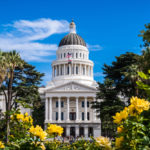 California: A new bill would make election recounts more expensive. The legislation, which was approved by the Assembly and has headed to the state Senate, would also allow nonvoters to serve on paid recount boards. That has led some Republican legislators to say this would allow noncitizens to be hired to count votes. While the bill would make counts more costly, it could also make them easier. Recount requesters would have the option to select the batch order in which the ballots are recounted, which could make it easier to ascertain whether the cost of the recount is worth sustaining. Assembly Bill 930, authored by Assemblyman Chris Ward, D-San Diego, would require the individuals or groups requesting the state’s rare recounts to pay each morning for each day of staffing the recount boards that count the votes. The legislation also removes the requirement that the recount boards, staffed by individuals appointed by the local elections official, have to be voters. According to an analysis of the bill by the Assembly Elections Committee, “This change appears to be consistent with other recent changes to the state’s elections laws that allowed non-voters (including individuals who are legal permanent residents and students who are not yet old enough to register to vote) to serve as elections workers at polling places and vote centers.”
California: A new bill would make election recounts more expensive. The legislation, which was approved by the Assembly and has headed to the state Senate, would also allow nonvoters to serve on paid recount boards. That has led some Republican legislators to say this would allow noncitizens to be hired to count votes. While the bill would make counts more costly, it could also make them easier. Recount requesters would have the option to select the batch order in which the ballots are recounted, which could make it easier to ascertain whether the cost of the recount is worth sustaining. Assembly Bill 930, authored by Assemblyman Chris Ward, D-San Diego, would require the individuals or groups requesting the state’s rare recounts to pay each morning for each day of staffing the recount boards that count the votes. The legislation also removes the requirement that the recount boards, staffed by individuals appointed by the local elections official, have to be voters. According to an analysis of the bill by the Assembly Elections Committee, “This change appears to be consistent with other recent changes to the state’s elections laws that allowed non-voters (including individuals who are legal permanent residents and students who are not yet old enough to register to vote) to serve as elections workers at polling places and vote centers.”
 Denver, Colorado: Denver City Council members have proposed two measures that could significantly change local elections. One measure would reform the entire Denver election system by adopting ranked-choice voting, a second measure would change how the city elects at-large council members. The two measures are being proposed by different council members, and could conflict with one another as written. Both would amend the city’s charter, which would require voter approval during the November election. Proponents of both measures argue they would give voters more choice and influence, though ranked-choice voting has been criticized as complex and confusing. Both ideas were discussed at the city council’s Budget and Policy Committee this week. No actions were taken, but the sponsoring council members hope to pass the measures through council next month, in time to put the proposals on the November ballot.
Denver, Colorado: Denver City Council members have proposed two measures that could significantly change local elections. One measure would reform the entire Denver election system by adopting ranked-choice voting, a second measure would change how the city elects at-large council members. The two measures are being proposed by different council members, and could conflict with one another as written. Both would amend the city’s charter, which would require voter approval during the November election. Proponents of both measures argue they would give voters more choice and influence, though ranked-choice voting has been criticized as complex and confusing. Both ideas were discussed at the city council’s Budget and Policy Committee this week. No actions were taken, but the sponsoring council members hope to pass the measures through council next month, in time to put the proposals on the November ballot.
 Iowa: Gov. Kim Reynolds signed two bills related to Iowa’s election laws this week, making changes to the state’s citizenship verification for voting and election recount processes. House File 954, was the bill Secretary of State Paul Pate proposed to better allow his office to check the citizenship status and other eligibility requirements of those on Iowa’s voter rolls. The bill gives the secretary of state’s office the ability to contract with federal and state agencies, and with private entities, for voter roll verification and maintenance, in addition to setting up a process for setting a voter’s registration status as “unconfirmed” when the state or county officials have received information from a “reliable source” that the person is not qualified to vote. The bill gives tools to election officials for voter eligibility verification before Election Day, but also allows registered voters to be challenged over their citizenship status at the polls. A challenged voter would have to present precinct election officials with evidence they are qualified to vote to cast a regular ballot. If the challenge is not withdrawn, they would cast a provisional ballot. The second measure, House File 928, makes changes to Iowa’s system for election recounts, including setting new limits on who can request recounts. For statewide and federal races, the election results would have to have a 0.15% difference in votes between candidates for a candidate to request a recount. For state legislative and local races, a difference of 1% or 50 votes would be required. This would stop recounts in future elections similar to those requested in recent elections, like the 2024 election recount for the race between U.S. Rep. Mariannette Miller-Meeks and Christina Bohannan, that was within 0.2%. The measure would also make changes to election recount boards. Under the previous system, each candidate in a recount designates one person to serve on the board, alongside a third person agreed upon by both candidates. The new law has county auditors lead election recount boards with their staff and hired election workers, adding the requirement that boards must have an equal numbers of workers from each political party. Candidates can choose up to five people to observe the recount process in each county.
Iowa: Gov. Kim Reynolds signed two bills related to Iowa’s election laws this week, making changes to the state’s citizenship verification for voting and election recount processes. House File 954, was the bill Secretary of State Paul Pate proposed to better allow his office to check the citizenship status and other eligibility requirements of those on Iowa’s voter rolls. The bill gives the secretary of state’s office the ability to contract with federal and state agencies, and with private entities, for voter roll verification and maintenance, in addition to setting up a process for setting a voter’s registration status as “unconfirmed” when the state or county officials have received information from a “reliable source” that the person is not qualified to vote. The bill gives tools to election officials for voter eligibility verification before Election Day, but also allows registered voters to be challenged over their citizenship status at the polls. A challenged voter would have to present precinct election officials with evidence they are qualified to vote to cast a regular ballot. If the challenge is not withdrawn, they would cast a provisional ballot. The second measure, House File 928, makes changes to Iowa’s system for election recounts, including setting new limits on who can request recounts. For statewide and federal races, the election results would have to have a 0.15% difference in votes between candidates for a candidate to request a recount. For state legislative and local races, a difference of 1% or 50 votes would be required. This would stop recounts in future elections similar to those requested in recent elections, like the 2024 election recount for the race between U.S. Rep. Mariannette Miller-Meeks and Christina Bohannan, that was within 0.2%. The measure would also make changes to election recount boards. Under the previous system, each candidate in a recount designates one person to serve on the board, alongside a third person agreed upon by both candidates. The new law has county auditors lead election recount boards with their staff and hired election workers, adding the requirement that boards must have an equal numbers of workers from each political party. Candidates can choose up to five people to observe the recount process in each county.
 Michigan: Rep. James DeSana (R-Carleton) called for the House to issue articles of impeachment against Secretary of State Jocelyn Benson – who is also a Democratic Party frontrunner for the 2026 gubernatorial primary. In calling for the impeachment, DeSana cited what he called unlawful election directives, a failure to preserve critical election records and supposed conduct that has undermined the public trust. Benson in a statement called the effort a “clown show.” The articles accuse Benson of exceeding her authority during her tenure by allegedly ignoring procedural requirements imposed by the Michigan Legislature through statute, her alleged donations to a political action committee in support of Michigan Supreme Court Justice Kyra Harris Bolden when she sought to retain her seat last year – allegedly just before her department’s attorneys argued before the high court in an election inspector challenge – and Benson’s office’s banning of firearms at polling locations. DeSana also said Benson’s office’s handling of absentee ballots during the 2020 presidential election was part of his calculus to call for her impeachment. In response, Benson said that she believes in oversight and transparency, but “this isn’t it.” “This is Republican lawmakers abusing their authority to access sensitive election information that would allow them – or any conspiracy theorists they share it with – to tamper with election equipment, interfere with the chain of custody of ballots, or impersonate a clerk on Election Day,” Benson said. “I continue to call on Michigan House Speaker Matt Hall and his caucus to work with us and a judicial mediator to help us reach a resolution to this matter.”
Michigan: Rep. James DeSana (R-Carleton) called for the House to issue articles of impeachment against Secretary of State Jocelyn Benson – who is also a Democratic Party frontrunner for the 2026 gubernatorial primary. In calling for the impeachment, DeSana cited what he called unlawful election directives, a failure to preserve critical election records and supposed conduct that has undermined the public trust. Benson in a statement called the effort a “clown show.” The articles accuse Benson of exceeding her authority during her tenure by allegedly ignoring procedural requirements imposed by the Michigan Legislature through statute, her alleged donations to a political action committee in support of Michigan Supreme Court Justice Kyra Harris Bolden when she sought to retain her seat last year – allegedly just before her department’s attorneys argued before the high court in an election inspector challenge – and Benson’s office’s banning of firearms at polling locations. DeSana also said Benson’s office’s handling of absentee ballots during the 2020 presidential election was part of his calculus to call for her impeachment. In response, Benson said that she believes in oversight and transparency, but “this isn’t it.” “This is Republican lawmakers abusing their authority to access sensitive election information that would allow them – or any conspiracy theorists they share it with – to tamper with election equipment, interfere with the chain of custody of ballots, or impersonate a clerk on Election Day,” Benson said. “I continue to call on Michigan House Speaker Matt Hall and his caucus to work with us and a judicial mediator to help us reach a resolution to this matter.”
 Nevada: Assembly Speaker Steve Yeager (D-Las Vegas) is proposing new voter ID requirements as part of a potential deal with Gov. Joe Lombardo to resurrect a vetoed effort to increase the number of ballot drop boxes in the days leading up to an election. The proposal, obtained by The Nevada Independent, is set to be introduced as an amendment to AB499, an otherwise innocuous election bill related to the publication of a voter services portal on county clerks’ websites. The prospective deal follows initial conversations between Democrats and the governor’s office and would mark a significant shift in Democrats’ stance on voter ID. The party previously argued that these requirements could disenfranchise low-income voters and even unsuccessfully sued to block a ballot question last year that more than 70 percent of voters later approved in the 2024 election. The language for the measure is based on feedback from local clerks and election officials, the operative said, adding that it’s designed to enable them to successfully implement identification and verification requirements. However, Douglas County Clerk Amy Burgans said in an email on Friday that county clerks did not learn of the amendment until after The Indy’s article was published, and that there are concerns with specific elements of the proposal. In a statement, Nevada Secretary of State Cisco Aguilar, who has previously opposed voter ID requirements, said “voters made their voices heard at the ballot box supporting similar changes” and that he is “committed to ensuring that new laws are implemented without any unforeseen consequences that would limit the constitutional right to vote for our citizens.”
Nevada: Assembly Speaker Steve Yeager (D-Las Vegas) is proposing new voter ID requirements as part of a potential deal with Gov. Joe Lombardo to resurrect a vetoed effort to increase the number of ballot drop boxes in the days leading up to an election. The proposal, obtained by The Nevada Independent, is set to be introduced as an amendment to AB499, an otherwise innocuous election bill related to the publication of a voter services portal on county clerks’ websites. The prospective deal follows initial conversations between Democrats and the governor’s office and would mark a significant shift in Democrats’ stance on voter ID. The party previously argued that these requirements could disenfranchise low-income voters and even unsuccessfully sued to block a ballot question last year that more than 70 percent of voters later approved in the 2024 election. The language for the measure is based on feedback from local clerks and election officials, the operative said, adding that it’s designed to enable them to successfully implement identification and verification requirements. However, Douglas County Clerk Amy Burgans said in an email on Friday that county clerks did not learn of the amendment until after The Indy’s article was published, and that there are concerns with specific elements of the proposal. In a statement, Nevada Secretary of State Cisco Aguilar, who has previously opposed voter ID requirements, said “voters made their voices heard at the ballot box supporting similar changes” and that he is “committed to ensuring that new laws are implemented without any unforeseen consequences that would limit the constitutional right to vote for our citizens.”
 North Carolina: Republican state House leaders this week delayed a hearing on a bill that would make it a misdemeanor to hold voter registration drives in North Carolina. The move came as the bill’s opponents organized a protest at the hearing, and as election law experts questioned whether the proposal would conflict with federal law. House Bill 127 would make it a crime for anyone except an election board employee or Division of Motor Vehicles employee to give someone a voter registration form. It would essentially ban voter registration drives by individuals or private groups, which could only hand out sample forms with instructions on where to find and fill out the real thing. Voter registration forms could only be accessed via elections offices or the state DMV. The measure was scheduled for a hearing in House Elections June 3 morning. But late June 2, as voting-rights groups organized a protest at the hearing, the committee meeting was cancelled. Committee leaders didn’t immediately respond to questions about the reason for the cancellation.
North Carolina: Republican state House leaders this week delayed a hearing on a bill that would make it a misdemeanor to hold voter registration drives in North Carolina. The move came as the bill’s opponents organized a protest at the hearing, and as election law experts questioned whether the proposal would conflict with federal law. House Bill 127 would make it a crime for anyone except an election board employee or Division of Motor Vehicles employee to give someone a voter registration form. It would essentially ban voter registration drives by individuals or private groups, which could only hand out sample forms with instructions on where to find and fill out the real thing. Voter registration forms could only be accessed via elections offices or the state DMV. The measure was scheduled for a hearing in House Elections June 3 morning. But late June 2, as voting-rights groups organized a protest at the hearing, the committee meeting was cancelled. Committee leaders didn’t immediately respond to questions about the reason for the cancellation.
 Texas: According to Votebeat, Texas Attorney General Ken Paxton appears unlikely to gain new powers to prosecute election crimes after the House and Senate failed May 31 to reach a deadline to work out their differences on how much leeway to grant the state’s top legal office in such cases. That development in the waning days of the regular 2025 legislative session ending June 1 comes two years after the House voted to impeach Paxton on misconduct allegations that included bribery and abuse of office. The Senate later acquitted Paxton. House Bill 5138 was filed by state Rep. Matt Shaheen, a Republican from North Texas. The Senate passed a version that would have given the attorney general’s office the power to unilaterally prosecute local election crimes when a county fails to do so. The House had previously agreed to grant Paxton’s office more powers to prosecute such cases, but only after local prosecutors considered the case. Shaheen filed the bill after the Texas Court of Criminal Appeals, the state’s highest criminal court, found Paxton’s office does not have authority to independently prosecute criminal election cases in trial courts without the request of a local prosecutor. Under the Senate’s version, local law enforcement would be required to send a report to the attorney general’s office if it believes there is probable cause to suspect that an election crime has been committed. The attorney general’s office would then have the authority to prosecute. Local prosecutors and law enforcement would be required to turn over any information they have about election crime investigations to the attorney general’s office. Under the House’s version of the bill, law enforcement agencies would be required to notify the attorney general’s office when reporting a potential election crime to local prosecutors. The attorney general could investigate only if the local prosecutor took no action on those reports for six months. And under the bill, local prosecutors could challenge the attorney general’s assertion of jurisdiction to investigate.
Texas: According to Votebeat, Texas Attorney General Ken Paxton appears unlikely to gain new powers to prosecute election crimes after the House and Senate failed May 31 to reach a deadline to work out their differences on how much leeway to grant the state’s top legal office in such cases. That development in the waning days of the regular 2025 legislative session ending June 1 comes two years after the House voted to impeach Paxton on misconduct allegations that included bribery and abuse of office. The Senate later acquitted Paxton. House Bill 5138 was filed by state Rep. Matt Shaheen, a Republican from North Texas. The Senate passed a version that would have given the attorney general’s office the power to unilaterally prosecute local election crimes when a county fails to do so. The House had previously agreed to grant Paxton’s office more powers to prosecute such cases, but only after local prosecutors considered the case. Shaheen filed the bill after the Texas Court of Criminal Appeals, the state’s highest criminal court, found Paxton’s office does not have authority to independently prosecute criminal election cases in trial courts without the request of a local prosecutor. Under the Senate’s version, local law enforcement would be required to send a report to the attorney general’s office if it believes there is probable cause to suspect that an election crime has been committed. The attorney general’s office would then have the authority to prosecute. Local prosecutors and law enforcement would be required to turn over any information they have about election crime investigations to the attorney general’s office. Under the House’s version of the bill, law enforcement agencies would be required to notify the attorney general’s office when reporting a potential election crime to local prosecutors. The attorney general could investigate only if the local prosecutor took no action on those reports for six months. And under the bill, local prosecutors could challenge the attorney general’s assertion of jurisdiction to investigate.
 Wisconsin: Months after the Wisconsin Supreme Court rejected a complaint about a Racine mobile-voting van, Republican lawmakers are pushing to make it easier to bring future complaints to court if they’re dismissed by the Wisconsin Elections Commission. A Republican bill would make it possible for anyone to appeal decisions rejecting an election complaint. To do that, the legislation would tweak state law by specifying that people who appeal WEC decisions in court will be considered to have standing, “regardless of whether the complainant has suffered an injury to a legally recognized interest.” State Rep. Robert Wittke, R-Caledonia, told WPR it’s an election integrity bill aimed at making those who file complaints with the elections commission “feel like they have had their complaint addressed.” He said while some may conclude it might create a situation where election complaints are appealed regardless of why the commission dismisses them, “maybe it will put both parties on equal footing.” “And maybe there will be a better chance that it’ll get resolved at that (commission) level rather than having to go to court,” Witke said.
Wisconsin: Months after the Wisconsin Supreme Court rejected a complaint about a Racine mobile-voting van, Republican lawmakers are pushing to make it easier to bring future complaints to court if they’re dismissed by the Wisconsin Elections Commission. A Republican bill would make it possible for anyone to appeal decisions rejecting an election complaint. To do that, the legislation would tweak state law by specifying that people who appeal WEC decisions in court will be considered to have standing, “regardless of whether the complainant has suffered an injury to a legally recognized interest.” State Rep. Robert Wittke, R-Caledonia, told WPR it’s an election integrity bill aimed at making those who file complaints with the elections commission “feel like they have had their complaint addressed.” He said while some may conclude it might create a situation where election complaints are appealed regardless of why the commission dismisses them, “maybe it will put both parties on equal footing.” “And maybe there will be a better chance that it’ll get resolved at that (commission) level rather than having to go to court,” Witke said.
 Wisconsin Rulemaking: Wisconsin communities with fewer than 7,500 people can hand count ballots under a decision by the state elections commission last week. However, under the Wisconsin Elections Commission decision, those communities and all other Wisconsin towns, villages and cities must still comply with federal law and provide at least one electronic voting machine at a polling location to accommodate voters with disabilities. The commission’s decision came in reaction to a complaint against the northwestern Wisconsin town of Thornapple, population about 700, over its decision to hand count ballots in the April 2024 presidential primary or the August state primary. The decision also comes as a federal lawsuit over Thornapple’s decision not to have an accessible voting machine continues. A federal judge in October sided with the U.S. Department of Justice and ruled Thornapple was violating 2002’s Help America Vote Act, or HAVA. The judge ordered the town to offer disabled people accessible voting machines. An appeal by the town is pending. Under the commission’s decision, communities with fewer than 7,500 people can choose to have no other electronic vote-casting or tabulating machines other than one for disabled voters.
Wisconsin Rulemaking: Wisconsin communities with fewer than 7,500 people can hand count ballots under a decision by the state elections commission last week. However, under the Wisconsin Elections Commission decision, those communities and all other Wisconsin towns, villages and cities must still comply with federal law and provide at least one electronic voting machine at a polling location to accommodate voters with disabilities. The commission’s decision came in reaction to a complaint against the northwestern Wisconsin town of Thornapple, population about 700, over its decision to hand count ballots in the April 2024 presidential primary or the August state primary. The decision also comes as a federal lawsuit over Thornapple’s decision not to have an accessible voting machine continues. A federal judge in October sided with the U.S. Department of Justice and ruled Thornapple was violating 2002’s Help America Vote Act, or HAVA. The judge ordered the town to offer disabled people accessible voting machines. An appeal by the town is pending. Under the commission’s decision, communities with fewer than 7,500 people can choose to have no other electronic vote-casting or tabulating machines other than one for disabled voters.
Legal Updates
 Arizona: Visiting Judge Michael Latham of the Cochise County Superior Court is allowing county officials to throw out the results of a local tax election after challengers identified a requirement in state law that they said the county didn’t follow — one that applies only to a specific kind of election and that other counties haven’t followed in the past. The case involves the county’s May 2023 all-mail election on a proposed tax to fund construction of a new jail. The Arizona Court of Appeals found last year that the county erred by not sending ballots to its 11,000 inactive voters. Because of that error, the county supervisors’ plan to redo the election is reasonable and legal, Latham ruled May 22. Latham’s ruling did not directly void the results of the election, in which voters approved the jail tax by 750 votes out of 25,032 ballots cast. But it will effectively do so, by allowing county supervisors to move forward with a proposed settlement with the residents who challenged the result. In that settlement, the county agrees to stop collecting the tax, at least until a new election can be held. “The Court of Appeals already ruled that the election was fatally flawed due to the disenfranchisement of approximately 11,000 voters,” Latham wrote, finding that the settlement calling for a new election was a reasonable way for the parties to resolve that issue.
Arizona: Visiting Judge Michael Latham of the Cochise County Superior Court is allowing county officials to throw out the results of a local tax election after challengers identified a requirement in state law that they said the county didn’t follow — one that applies only to a specific kind of election and that other counties haven’t followed in the past. The case involves the county’s May 2023 all-mail election on a proposed tax to fund construction of a new jail. The Arizona Court of Appeals found last year that the county erred by not sending ballots to its 11,000 inactive voters. Because of that error, the county supervisors’ plan to redo the election is reasonable and legal, Latham ruled May 22. Latham’s ruling did not directly void the results of the election, in which voters approved the jail tax by 750 votes out of 25,032 ballots cast. But it will effectively do so, by allowing county supervisors to move forward with a proposed settlement with the residents who challenged the result. In that settlement, the county agrees to stop collecting the tax, at least until a new election can be held. “The Court of Appeals already ruled that the election was fatally flawed due to the disenfranchisement of approximately 11,000 voters,” Latham wrote, finding that the settlement calling for a new election was a reasonable way for the parties to resolve that issue.
Mohave County Supervisor Ron Gould is renewing his bid to trim the legal rights of Attorney General Kris Mayes. Gould contends that Mayes constitutes a “real threat” to his powers and duties to certify elections simply because he believes that supervisors should be able to order a full hand count. But so far he has been unable to make his arguments after a trial judge last year tossed out his lawsuit, saying he has not shown any imminent threat of prosecution. Gould is asking the state Court of Appeals to issue a ruling declaring he does have a legal right to pursue the case and directing Maricopa County Superior Court Judge Bradley Astrowsky to let him present his evidence. The new bid is getting a fight from Assistant Attorney General Alexander Samuels. He is telling the appellate court that Gould’s claims are “speculative,” especially as he has “not articulated a concrete plan to violate the law” in the future. Samuels pointed out that state law requires the use of electronic tabulation of ballots, not the kind of hand count that Gould has pushed for in the past and may be seeking in the future. And he noted that Gould is not challenging the legality of that law but simply wants a declaration that he can’t be prosecuted for breaking it.
U.S. District Court Judge Susan Bolton isn’t reversing her ruling that voided provisions of a 2022 law designed to require proof of citizenship to vote on federal races. In a new order, Bolton acknowledged that the federal government no longer wants any part of the lawsuit it filed against the state when Joe Biden was president to protect the rights of voters. She actually had issued a ruling finding some of what is in that law illegal, though there are still other legal issues to be resolved. But Bolton rejected a bid by the attorneys for the Department of Justice, now under President Donald Trump, to say she should vacate that judgment, at least as far the federal government is concerned, a move that would pave the way to dismiss all of the claims originally made against the state by the Biden administration. The problem with all that, the judge said, is the feds were just one of seven civil and voting rights groups who all challenged the laws. More to the point, those cases were consolidated. And her ruling finding the sections of the 2022 law illegal applied to that entire case. “Striking the listing of one of the seven cases listed as consolidated … would delete a fact not vacate a judgment,” Bolton wrote. “The United States improperly seeks to delete its lawsuit from the factual listing of the cases that were consolidated.” All of that means is that the judgment that the provisions of the 2022 are illegal remains valid. And that ruling also has been upheld by the 9th U.S. Circuit Court of Appeals.
 California: The California Attorney General’s Office filed an appeal in its lawsuit seeking to overturn Huntington Beach’s voter ID law, almost two months after an Orange County judge rejected the state’s arguments in the case and said the city’s new law does not violate the right to vote. The Attorney General’s Office has been critical of the charter amendment since it was proposed. Approved by voters, the ordinance allows the city to require voters to present their identification at polling places in city elections as early as 2026. The notice of appeal filed moves the case forward to a state appeals court that will be fully briefed and consider arguments. “California’s elections are fair, safe and secure,” Attorney General Rob Bonta said in a statement. “We respectfully ask the California Fourth District Court of Appeal to reverse the lower court’s decision and overturn Huntington Beach’s unlawful voter ID policy. State law supersedes local law when it comes to constitutional matters like the right to vote — and we will continue to fight to safeguard this fundamental right in court.” Voters approved Measure A in early 2024, and the city since has been defending it from a lawsuit brought by the state office.
California: The California Attorney General’s Office filed an appeal in its lawsuit seeking to overturn Huntington Beach’s voter ID law, almost two months after an Orange County judge rejected the state’s arguments in the case and said the city’s new law does not violate the right to vote. The Attorney General’s Office has been critical of the charter amendment since it was proposed. Approved by voters, the ordinance allows the city to require voters to present their identification at polling places in city elections as early as 2026. The notice of appeal filed moves the case forward to a state appeals court that will be fully briefed and consider arguments. “California’s elections are fair, safe and secure,” Attorney General Rob Bonta said in a statement. “We respectfully ask the California Fourth District Court of Appeal to reverse the lower court’s decision and overturn Huntington Beach’s unlawful voter ID policy. State law supersedes local law when it comes to constitutional matters like the right to vote — and we will continue to fight to safeguard this fundamental right in court.” Voters approved Measure A in early 2024, and the city since has been defending it from a lawsuit brought by the state office.
 Colorado: U.S. District Judge S. Kato Crews sentenced Teak Ty Brockbank, 45, to three years in prison for threats he made against elections officials. Crews said the penalty for such “keyboard terrorism” needed to be serious enough to deter others, particularly because threats against public officials are on the rise. People need to work out differences through the democratic process, not violence, Crews said. “The public must not accept this as the norm,” he said in handing down the sentence. Brockbank pleaded guilty in October to making threats between September 2021 and August 2022 against Colorado Secretary of State Jena Griswold and former Arizona Secretary of State Katie Hobbs, who is now governor. He also threatened a Colorado judge overseeing his DUI case and threatened to kill any federal agents who came to his house. Before announcing the sentence, Crews read some of Brockbank’s threats, including descriptions of how officials should be killed. Crews said he believed Brockbank’s remorse was genuine and urged him to follow through with his decision to turn away from hate even though he was going to prison.
Colorado: U.S. District Judge S. Kato Crews sentenced Teak Ty Brockbank, 45, to three years in prison for threats he made against elections officials. Crews said the penalty for such “keyboard terrorism” needed to be serious enough to deter others, particularly because threats against public officials are on the rise. People need to work out differences through the democratic process, not violence, Crews said. “The public must not accept this as the norm,” he said in handing down the sentence. Brockbank pleaded guilty in October to making threats between September 2021 and August 2022 against Colorado Secretary of State Jena Griswold and former Arizona Secretary of State Katie Hobbs, who is now governor. He also threatened a Colorado judge overseeing his DUI case and threatened to kill any federal agents who came to his house. Before announcing the sentence, Crews read some of Brockbank’s threats, including descriptions of how officials should be killed. Crews said he believed Brockbank’s remorse was genuine and urged him to follow through with his decision to turn away from hate even though he was going to prison.
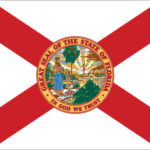 Florida: U.S. District Mark Walker has largely denied requests by grassroots campaigners to block portions of a new Florida law that restricts the state’s citizen-driven process for getting constitutional amendments on the ballot. Organizers of two separate campaigns had urged Walker to block implementation of parts of the law, arguing that the new requirements violate their First Amendment rights. But in an order issued this week, Walker granted a narrow injunction, barring state officials from enforcing one section of the law criminalizing ballot petition fraud against one campaign staffer. The order means that at least for now, the campaigns will largely have to operate under the new restrictions as they try to gather enough signatures to qualify for the 2026 ballot. Under Florida’s new law, an individual could be charged with a felony if they collect more than 25 signed ballot petitions, other than their own or those of immediate family members, and don’t register with the state as a petition circulator. The law signed last month by Republican Gov. Ron DeSantis also gives campaigns just 10 days instead of the previous 30 to return signed petition forms to local elections officials. Petitioners could also face stiff fines if they don’t return the petitions on time, or send them to the wrong county.
Florida: U.S. District Mark Walker has largely denied requests by grassroots campaigners to block portions of a new Florida law that restricts the state’s citizen-driven process for getting constitutional amendments on the ballot. Organizers of two separate campaigns had urged Walker to block implementation of parts of the law, arguing that the new requirements violate their First Amendment rights. But in an order issued this week, Walker granted a narrow injunction, barring state officials from enforcing one section of the law criminalizing ballot petition fraud against one campaign staffer. The order means that at least for now, the campaigns will largely have to operate under the new restrictions as they try to gather enough signatures to qualify for the 2026 ballot. Under Florida’s new law, an individual could be charged with a felony if they collect more than 25 signed ballot petitions, other than their own or those of immediate family members, and don’t register with the state as a petition circulator. The law signed last month by Republican Gov. Ron DeSantis also gives campaigns just 10 days instead of the previous 30 to return signed petition forms to local elections officials. Petitioners could also face stiff fines if they don’t return the petitions on time, or send them to the wrong county.
Jacqueline Dianne Wallace, 52, a native of Jamaica, is facing a number of federal charges, including voter fraud in Bay County. Wallace was allegedly living in Panama City Beach in January 2024 when she registered online to vote. Authorities say she then voted in the August 2024 Presidential Primary. Bay County Sheriff’s deputies arrested Wallace on May 1. She was booked into the Bay County Jail with a hold for ICE. Jail officials say she’s no longer there. In a press release, Bay County Supervisor of Elections Nina Ward told News 13, “My office is fully committed to providing access to eligible voters however it is equally important to ensure the integrity of the voter rolls by removing those who are not eligible. We have fully cooperated with the Department of Homeland Security during this investigation and will continue to be vigilant in identifying and stopping voter fraud.”
 Illinois: The U.S. Supreme Court will decide whether a GOP congressman can challenge Illinois’ decision to count mail-in ballots that are cast, but not received, before the end of Election Day. Republicans have been trying to end that practice − adopted by many states − through lawsuits and a March executive order from President Donald Trump that is being litigated. They argue that states are illegally extending the election beyond the date set by federal law. But when Rep. Michael Bost, R-Illinois, and two presidential electors tried to make that case, lower courts said they hadn’t been sufficiently harmed by the policy so they couldn’t sue. The Supreme Court on June 2 said it will decide if the lawsuit can move forward. The Chicago-based 7th U.S. Circuit Court of Appeals in 2024 dismissed Bost’s argument that he has to spend campaign funds to contest any objectionable ballots that come in after Election Day. Judge John Lee called it “speculative at best” that later ballots could cause him to lose an election, noting he won by 75% in the 2022 election. One of the three appeals court judges who ruled on the lawsuit said he would have let it proceed.
Illinois: The U.S. Supreme Court will decide whether a GOP congressman can challenge Illinois’ decision to count mail-in ballots that are cast, but not received, before the end of Election Day. Republicans have been trying to end that practice − adopted by many states − through lawsuits and a March executive order from President Donald Trump that is being litigated. They argue that states are illegally extending the election beyond the date set by federal law. But when Rep. Michael Bost, R-Illinois, and two presidential electors tried to make that case, lower courts said they hadn’t been sufficiently harmed by the policy so they couldn’t sue. The Supreme Court on June 2 said it will decide if the lawsuit can move forward. The Chicago-based 7th U.S. Circuit Court of Appeals in 2024 dismissed Bost’s argument that he has to spend campaign funds to contest any objectionable ballots that come in after Election Day. Judge John Lee called it “speculative at best” that later ballots could cause him to lose an election, noting he won by 75% in the 2022 election. One of the three appeals court judges who ruled on the lawsuit said he would have let it proceed.
Thorn M. Smith, 67, an attorney from Peoria, faces up to five years in prison after being indicted this week for voting more than once. A no-bond, no-extradition warrant was issued for Smith. He’s accused of voting more than once in the April 1 general election. He allegedly “after having voted once, knowingly accepted another ballot.” According to Anna Perales of the State’s Attorney’s office, Smith voted using a mail-in ballot and on April 1, when he arrived at his polling place, an election judge’s computer indicated he had already gotten mail-in ballot. “Despite this, Smith signed a form stating that he had not previously voted and proceeded to submit a second provisional ballot,” Perales said. “Processes in place through the Election Commission noted this second illegal ballot, and it was not counted in the final certified election results.”
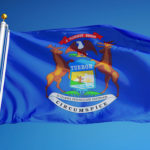 Michigan: Haoxiang Ga, a Chinese national charged with voting illegally has fled the U.S., according to a criminal complaint filed by the Federal Bureau of Investigation that was unsealed May 30. Safety officials with the University of Michigan spoke with Gao on Oct. 28 after hearing reports that a student had unlawfully cast a vote in the 2024 general election. Gao admitted during the conversation with the school that he registered to vote and did cast a vote at a polling location on campus on Oct. 27. He was charged by the state on Oct. 30 with one count each of unauthorized elector attempting to vote and making a false affidavit for the purpose of securing voter registration, court records show. During Gao’s arraignment, a judge ordered him to surrender his Chinese passport and not to leave Michigan, according to the criminal complaint. The passport handed in had a serial number ending in “1332.” A warrant for Gao was later issued after he missed court hearings on March 6 and April 24. The FBI said in the filing that Gao’s passport was in the possession of school safety officials during a court hearing. However, according to prosecutors, Gao boarded a Delta flight from Detroit International Airport to Shanghai, China, on Jan. 19 using a Chinese passport in his name with a serial number ending in “7137.”
Michigan: Haoxiang Ga, a Chinese national charged with voting illegally has fled the U.S., according to a criminal complaint filed by the Federal Bureau of Investigation that was unsealed May 30. Safety officials with the University of Michigan spoke with Gao on Oct. 28 after hearing reports that a student had unlawfully cast a vote in the 2024 general election. Gao admitted during the conversation with the school that he registered to vote and did cast a vote at a polling location on campus on Oct. 27. He was charged by the state on Oct. 30 with one count each of unauthorized elector attempting to vote and making a false affidavit for the purpose of securing voter registration, court records show. During Gao’s arraignment, a judge ordered him to surrender his Chinese passport and not to leave Michigan, according to the criminal complaint. The passport handed in had a serial number ending in “1332.” A warrant for Gao was later issued after he missed court hearings on March 6 and April 24. The FBI said in the filing that Gao’s passport was in the possession of school safety officials during a court hearing. However, according to prosecutors, Gao boarded a Delta flight from Detroit International Airport to Shanghai, China, on Jan. 19 using a Chinese passport in his name with a serial number ending in “7137.”
 New Hampshire: The New Hampshire Supreme Court ruled this week that the House district maps created by the Republican-controlled state Legislature in 2020 are not illegal, despite allegations made by the cities of Dover and Rochester and a number of residents from throughout New Hampshire. In 2022, Dover, Rochester, and 10 residents filed a lawsuit against the State of New Hampshire and Secretary of State David Scanlan alleging that the state’s maps violated the New Hampshire Constitution. In 2024, a trial court in Strafford County ruled against Dover and Rochester, agreeing with the state and Scanlan that creating maps where every city, town, or ward with the necessary population had their own districts would be impossible to accomplish. It also ruled previous case law determined that presumptive violations of the one-person-one-vote requirement may be justified by efforts to make districts compact, respect municipal boundaries, preserve the cores of prior districts, and avoid contests between incumbent representatives. Dover, Rochester, and the rest of the plaintiffs promptly appealed the ruling and the state Supreme Court considered the case. On June 4, the Supreme Court ruled that because they did not sufficiently show that the Legislature had “no rational or legitimate basis” to enact the map, they denied the appeal.
New Hampshire: The New Hampshire Supreme Court ruled this week that the House district maps created by the Republican-controlled state Legislature in 2020 are not illegal, despite allegations made by the cities of Dover and Rochester and a number of residents from throughout New Hampshire. In 2022, Dover, Rochester, and 10 residents filed a lawsuit against the State of New Hampshire and Secretary of State David Scanlan alleging that the state’s maps violated the New Hampshire Constitution. In 2024, a trial court in Strafford County ruled against Dover and Rochester, agreeing with the state and Scanlan that creating maps where every city, town, or ward with the necessary population had their own districts would be impossible to accomplish. It also ruled previous case law determined that presumptive violations of the one-person-one-vote requirement may be justified by efforts to make districts compact, respect municipal boundaries, preserve the cores of prior districts, and avoid contests between incumbent representatives. Dover, Rochester, and the rest of the plaintiffs promptly appealed the ruling and the state Supreme Court considered the case. On June 4, the Supreme Court ruled that because they did not sufficiently show that the Legislature had “no rational or legitimate basis” to enact the map, they denied the appeal.
 Ohio: Secretary of State Frank LaRose announced this week he is referring evidence of potential election fraud to Ohio Attorney General Dave Yost and a number of attorneys general across the country for “further review and potential prosecution.” Besides Yost, the referrals were sent to attorneys general in eight other jurisdictions: Virginia, Arizona, Colorado, District of Columbia, Illinois, Kentucky, Maryland, and South Carolina, according to LaRose’s office. These cases were identified through an ongoing review of Ohio’s voter registration database by the secretary’s Election Integrity Unit, which uses state and federal data to flag potential violations. The cases flagged Tuesday include 11 potential instances of double-voting across multiple states, and 30 potential noncitizen voter registrations in Ohio, according to LaRose’s office. LaRose’s office has previously referred hundreds of potential voter fraud cases, though conviction rates have remained very low. As of September 2024, only 12 of more than 600 cases LaRose has referred to county prosecutors since taking office in 2019 have resulted in criminal charges.
Ohio: Secretary of State Frank LaRose announced this week he is referring evidence of potential election fraud to Ohio Attorney General Dave Yost and a number of attorneys general across the country for “further review and potential prosecution.” Besides Yost, the referrals were sent to attorneys general in eight other jurisdictions: Virginia, Arizona, Colorado, District of Columbia, Illinois, Kentucky, Maryland, and South Carolina, according to LaRose’s office. These cases were identified through an ongoing review of Ohio’s voter registration database by the secretary’s Election Integrity Unit, which uses state and federal data to flag potential violations. The cases flagged Tuesday include 11 potential instances of double-voting across multiple states, and 30 potential noncitizen voter registrations in Ohio, according to LaRose’s office. LaRose’s office has previously referred hundreds of potential voter fraud cases, though conviction rates have remained very low. As of September 2024, only 12 of more than 600 cases LaRose has referred to county prosecutors since taking office in 2019 have resulted in criminal charges.
 Wisconsin: The U.S. Department of Justice issued a formal warning to the Wisconsin Election Commission, accusing it of violating federal law by failing to provide voters with a required complaint process under the Help America Vote Act (HAVA). And it called for the withholding of federal election funds from the state. In a letter released this week by the DOJ’s Civil Rights Division, officials charged that the Wisconsin Elections Commission “has refused to provide any administrative complaint process or hearing regarding HAVA complaints against the Commission.” A complaint process would likely make it easier for activists or officials to pressure the state to enforce stricter rules around the information voters must provide when registering to vote. The DOJ emphasized that compliance with HAVA is mandatory and that the receipt of federal funds under the act is conditioned on such compliance. “Your actions justify a bar against the Wisconsin Elections Commission receiving any future funding from the U.S. Election Assistance Commission,” the letter states. Wisconsin received more than $77 million in HAVA-related support to date, according to the letter. “We have made it our highest priority to identify jurisdictions that fail to follow our elections laws and vigorously enforce the law by all means available,” Assistant Attorney General Harmeet K. Dhillon of the Justice Department’s Civil Rights Division said in a statement.
Wisconsin: The U.S. Department of Justice issued a formal warning to the Wisconsin Election Commission, accusing it of violating federal law by failing to provide voters with a required complaint process under the Help America Vote Act (HAVA). And it called for the withholding of federal election funds from the state. In a letter released this week by the DOJ’s Civil Rights Division, officials charged that the Wisconsin Elections Commission “has refused to provide any administrative complaint process or hearing regarding HAVA complaints against the Commission.” A complaint process would likely make it easier for activists or officials to pressure the state to enforce stricter rules around the information voters must provide when registering to vote. The DOJ emphasized that compliance with HAVA is mandatory and that the receipt of federal funds under the act is conditioned on such compliance. “Your actions justify a bar against the Wisconsin Elections Commission receiving any future funding from the U.S. Election Assistance Commission,” the letter states. Wisconsin received more than $77 million in HAVA-related support to date, according to the letter. “We have made it our highest priority to identify jurisdictions that fail to follow our elections laws and vigorously enforce the law by all means available,” Assistant Attorney General Harmeet K. Dhillon of the Justice Department’s Civil Rights Division said in a statement.
Opinions This Week
National Opinions: 2020 election lies | Stricter voting laws | Real ID
Alabama: Elections officials
California: Voter ID costs | Language assistance
Florida: Elections during emergencies
Indiana: Democracy
Kansas: Election legislation
Michigan: Election system
New Jersey: Ranked choice voting
New York: Automatic voter registration
North Carolina: Election administration
Ohio: Citizenship
Texas: Voting access
Wyoming: Weston County
Upcoming Events
130th Annual County and District Clerks’ Association of Texas (TAC) Conference: When: June 8-12. Where: Sugarland.
Election Science, Reform & Administration Summer Conference: The 9th Annual Summer Conference on Election Science, Reform, and Administration (ESRA) will take place from Monday, June 9 through Wednesday, June 11 2025 at Florida State University in Tallahassee, Florida. Planning for the conference is currently underway! Sign up for our mailing list to receive updates as information becomes available, including notifications about conference registration and programming. When: June 9-11. Where: Tallahassee, Florida.
June CERA Courses: The Election Center and Auburn University will be offering four in-person CERA courses in Phoenix, Arizona. The courses offered are: Course 3 (Strategic Planning & Budgeting); Course 7 (Enhancing Voter Participation); Course 11 (History I-Ancients to 1781); and Course 12 (History II-1781 to Modern Era). When: June 9-14. Where: Phoenix.
MACATFO Summer Conference [Minnesota]: When: June 9-13. Where: Brainard.
New Mexico Association of Counties (NMC) Annual Conference: When: June 16-19.
iGO Summer Conference: The International Association of Government Officials will hold their summer conference in Kansas City, Missouri from June 20-24. Please refer to the iGO website for more information and to register for the event.
Georgia Municipal Association-Municipal Election Superintendent 2025 Annual Convention: When: June 20-24. Where: Savannah.
57th Annual Association of Arkansas Counties (AACC) Conference: When: June 25-27. Where: Rogers/Benton County.
Massachusetts Town Clerks Association (MTCA)Conference 2: When: June 26. Where: Plymouth.
Ohio Secretary of State’s Summer Conference: When: June 30-July 1. Where: Columbus.
2025 National Association of Counties Annual Conference & Exposition: The National Association of Counties (NACo) Annual Conference is the premier gathering of elected and appointed officials from the nation’s 3,069 counties, parishes and boroughs. Conference content includes discussion of federal policies impacting counties, workshops lifting up county best practices, engaging general sessions, mobile tours across our host county, and more. NACo members also have the opportunity to influence the association’s direction and future during the Annual Business Meeting on the final day of the conference. When: July 11-14. Where: Philadelphia.
NASED Summer Conference: The National Association of State Election Directors will hold its summer conference in Oklahoma from July 22-24. Please refer to the NASED website for more information and to register for the event.
NASS Summer Conference: The National Association of Secretaries of State will hold its summer conference in Biloxi, Mississippi from August 4-7. Please refer to the NASS website for more information and to register for the event.
National Conference of State Legislatures Summit: NCSL is bringing the Legislative Summit back to Boston! Join us Aug. 4-6 to connect with legislators and staff from across the nation at an event jam-packed with great speakers, eye-opening policy sessions and after-hours experiences at some of Boston’s coolest venues. Help NCSL celebrate its 50th anniversary in style. When: August 4-6. Where: Boston
Election Center Annual Conference: The Election Center Annual Conference will be held in Salt Lake City. The conference will run August 20-22 and CERA courses will be offered August 23 and 24. The CERA courses offered will be: Course 5 (Ethics); Course 6 (Communications & Public Relations); and Two renewal courses to be announced. When: August 20 to 24. Where: Salt Lake City.
Protecting the Election: AI and Governance Conference at WashU: Join us for this two-day in-person research and practitioner conference at WashU on October 16-17, 2025, to discuss research regarding AI and governance and how this applies to U.S. elections. Research topics include how chatbots can be used to engage with voters, how social media influences voters, what the electorate knew (or did not know) about the candidates and issues during recent elections, misinformation in elections, rhetoric about election integrity, and AI strategies for the administration of elections. We will also hear from practitioners during the conferences about their experiences with and needs for AI in recent elections and their intentions for future use of AI in elections. When: Oct. 16-17. Where: St. Louis.
Job Postings This Week
electionlineWeekly publishes election administration job postings each week as a free service to our readers. To have your job listed in the newsletter, please send a copy of the job description, including a web link to mmoretti@electionline.org. Job postings must be received by 5pm on Wednesday in order to appear in the Thursday newsletter. Listings will run for three weeks or till the deadline listed in the posting.
Campaign Finance Manager, Michigan Dept. of State– This supervisory position is responsible for overseeing staff in the Campaign Finance Section of the Bureau of Elections to promote transparency in election finance and promote ethics in government. This position guides their team to provide service to the regulated community through phone, email, and remote appointments, and developing and implementing policies and procedures governing the work in that section. The position oversees analysts in their review and analysis of disclosure reports and campaign statements submitted under the Michigan Campaign Finance Act and Michigan Election Law. The position provides overall structure and guidance to the Campaign Finance Section by assigning, directing, monitoring, and reviewing work performed by staff. Additionally, this position oversees the more complex reporting by state-wide candidates and administers the public funding program for gubernatorial candidates. The incumbent, under general supervision by the Division Administrator, works within general methods, procedures, and exercises independent judgment to select appropriate courses of action. Salary: $2,740.00 – $4,086.40 Biweekly. Deadline: June 11. Application: For the complete job listing and to apply, click here.
City Clerk, Madison, Wisconsin– Are you ready to take on a high-impact role that defines the heartbeat of Madison’s government? As City Clerk, you’ll be at the helm of critical city operations, ensuring democracy runs smoothly, records are meticulously kept, and policies drive positive change. This isn’t just a job—it’s a mission! This is your chance to lead, plan, and execute diverse programs with precision and purpose. You’ll be the architect of Madison’s election processes, the guardian of official city documents, and the force behind vital licensing and permit systems. Every decision you make will shape the city’s future. Oversee the Clerk’s Office, providing visionary leadership and strategic direction; Ensure seamless elections, developing and implementing processes that uphold integrity; Manage licensing and permits, keeping Madison’s businesses and residents on track; Preserve city records, safeguarding critical documents as the custodian of official information; Support the Common Council, administering and recording proceedings with precision; and Influence policy, collaborating with city managers and leaders to drive impactful initiatives. Salary: $120,778 – $163,050. Deadline: June 23. Application: For the complete job listing and to apply, click here.
Community Engagement Coordinator, North Charleston, South Carolina– Partner with the Community Engagement Manager to identify and expand non-partisan community relationships. Cultivate connections with local businesses and civic organizations to boost visibility and support. Solicit and analyze community feedback to enhance outreach strategies. Create brochures, flyers, presentations, and digital content to educate the public about elections and voting procedures.Collaborate with the Marketing and Communications Manager to maintain clear, consistent, and timely messaging across platforms. Manage and update the outreach section of the agency’s website. Deliver presentations and training during outreach events. Plan and coordinate mid-scale public events such as National Voter Registration Day and poll worker appreciation initiatives. Represent BVRE at outreach events, tabling opportunities, and community meetings. Track outreach activity and report on engagement metrics and outcomes. Support special projects including the “I Voted” sticker contest, Adopt a Polling Location, and poll worker recruitment. Research best practices to enhance and expand outreach programming. Assist in maintaining a centralized repository of outreach materials and resources. Salary: $50,440 – $66,060. Application: For the complete job listing and to apply, click here.
Director of Elections, Iowa Secretary of State’s Office– The Office of the Iowa Secretary of State is seeking a Director of Elections. The Iowa Secretary of State’s Office seeks a professional and dynamic Director to lead our Elections Division team and continue the consistent record of excellence in election administration that this team has established. In recent years, the Division has implemented significant changes in election policy to increase the access and security of elections for Iowans. The Director will work with the leadership team to develop legislative election policies and procedures designed to modernize the Iowa election law. Advises and consults with local officials regarding compliance with all procedural and substantive laws relative to their respective election-related duties. The work will involve administrative, planning, coordinating and oversight work at a professional level involving the entire electoral process in the State of Iowa for the Office of the Secretary of State. Duties include oversight of federal and state election laws and other related statutes to ensure they are administered and applied appropriately. Supervision of a staff of clerical and technical employees, including a Deputy Director. Daily guidance and periodic training provided to county election commissioners. Work is performed under the general direction of the Deputy Secretary of State. Work outside of the regular work schedule is required. Travel for training, conferences, and meetings is required. Elections experience is preferred. Salary: $67,350 – $120,036. Deadline: June 8. Application: For the complete job listing and to apply, click here.
Election Services Manager, Arapahoe County, Colorado– The Election Service Manager performs managerial level administrative, supervisory, and professional work in carrying out a comprehensive public facing service operation. This position specifically supervises the Election Services team, which includes voter service polling center logistics, election/ballot security, ballot processing and election systems maintenance. Salary: $75,424 – $120,484. Deadline: June 15. Application: For the complete job listing and to apply, click here.
Election Specialist, Candidate Services, Palm Beach County, Florida– This position is responsible for the management and execution of services provided to candidates, political committees, electioneering communication organizations, political parties, community development districts, and special taxing districts. This includes establishing and maintaining an organized system for managing the required forms and records associated with filing and qualifying for office, candidate petitions, campaign finance reporting, financial disclosures, initiative petitions, and other related activities. Candidate Services staff must be organized and personable with a great attitude, be able to work well in a team environment, and meet deadlines under pressure. Excellent work ethic, including consistent performance, integrity, reliability, and attendance, is a must. Must be detail-oriented, be able to handle simultaneous projects, and be a self-starter. Salary: $21.63 – $24.04. Application: For the complete job listing and to apply, click here.
Elections Coordinator, Communications & Compliance, Union County, North Carolina– The Elections Coordinator, under moderate supervision, oversees and executes tasks within a designated area of the election process. In addition to their primary responsibilities, the coordinator provides cross-functional support to other election areas as needed, contributing to the overall efficiency and accuracy of election administration. This role also performs a range of administrative duties, including data management, documentation, and customer service. All duties must be carried out in strict compliance with state and federal election laws and regulations. Strong attention to detail, organizational proficiency, and the ability to collaborate effectively in a non-partisan manner is required. Salary: $48,460 – $72,690. Deadline June 9. Application: For the complete job listing and to apply, click here.
Elections Coordinator, Training & Education, Union County, North Carolina –The Elections Coordinator, under moderate supervision, oversees and executes tasks within a designated area of the election process. In addition to their primary responsibilities, the coordinator provides cross-functional support to other election areas as needed, contributing to the overall efficiency and accuracy of election administration. This role also performs a range of administrative duties, including data management, documentation, and customer service. All duties must be carried out in strict compliance with state and federal election laws and regulations. Strong attention to detail, organizational proficiency, and the ability to collaborate effectively in a non-partisan manner is required. Salary: $48,460 – $72,690. Deadline: June 9. Application: For the complete job listing and to apply, click here.
Elections Division Manager, Washington County, Minnesota– The Washington County Property Records and Taxpayer Services Department is seeking an experienced and collaborative leader to serve as our Elections Division Manager. We’re looking for a skilled manager with a strong background in election administration, voter registration, process management, or related fields. Experience leading complex operations, managing teams, and ensuring compliance with legal requirements will be highly valued. This position oversees all aspects of elections operations, ensuring compliance with statutory requirements and department objectives while leading a team of full-time and temporary employees to successfully administer federal, state, county, municipal, school district, and special elections. This is an excellent opportunity for a strategic thinker who excels under pressure, values integrity and transparency, and is dedicated to providing exceptional service to the residents of Washington County. Salary: $87,276 – $119,246. Deadline: June 5. Application: For the complete job listing and to apply, click here.
IT Assistant Manager, Palm Beach County, Florida– The Assistant IT Manager plays a supportive role in the smooth operation of the IT department, ensuring that both the technical infrastructure and the team are aligned with the organization’s goals. This position involves collaborating closely with the Election Technology Director to oversee the implementation of technology solutions that meet the needs of the organization. The Assistant IT Manager helps maintain an efficient and effective IT environment. Oversee daily operations of the IT department, including help desk operations and performance, troubleshooting issues, and ensuring efficient workflow. Hold department meetings and provide weekly performance summary. Manage IT projects under the direction of the Election Technology Director, ensuring timely completion, budget requirements, and organizational needs. Enforce IT policies and procedures to ensure data security, network access, and system availability. Assist in the management of IT staff by developing skills, coaching, and communicating job expectations. Coordinate vendor renewals, assist with IT budget development, and manage grant applications. Evaluate and assist in maintaining the organization’s disaster recovery and business continuity plans for IT. Assist with IT Public Records requests research and fulfillment. Assist the Election Technology Director in all facets of IT operations. Lead projects and mentor team members. Application: For the complete job listing and to apply, click here.
Physical Security Specialist, Palm Beach County, Florida– This position is responsible for administration of the physical security programs in a manner consistent with Supervisor of Elections Office policies, procedures, quality standards, and applicable local, state, and federal regulations. These programs include conducting facility security risk assessments, assisting with access control, monitoring alarms and CCTV systems, and providing security related training. Must be organized and personable with a great attitude, be able to work well in a team environment, and meet deadlines under pressure. Excellent work ethic, including consistent performance, integrity, reliability, and attendance, is a must. Candidate must be detail-oriented and understand the importance of security and safety for all. Must be available 24/7 365, be able to handle simultaneous projects, and be a self-starter. Application: For the complete job listing and to apply, click here.
Senior Elections Supervisor, Placer County, California– The Placer County Clerk-Recorder-Elections Office has a current vacancy for a Senior Elections Supervisor. The Office is looking for someone with experience in the development, supervision, and administration of elections programs. The ideal candidate will have supervised in an elections office or similar agency that emphasizes cooperation, accountability and transparency and has the ability to communicate effectively with management, staff, other county departments, jurisdictions and the voters of Placer County. To learn more about the Elections Division of the Clerk-Recorder-Elections Office please click here. In addition to the minimum education and experience, the ideal candidate will possess experience and vision in the following areas: State and federal election laws; Voting systems; General operating policies and functions of the California Secretary of State’s Office; Best practices and current trends in successful election administration, community education and outreach programs; Principles and techniques of effective employee supervision and development, training, management practices and public administration. Salary: $69,056.00 – $86,195.20/year. Application: For the complete job listing and to apply, click here.
Voter Registration and Absentee Manager, Charleston County, South Carolina– Are you driven by public service and committed to ensuring the accuracy of voter registration? Join us as the Voter Registration and Absentee Manager and lead a team dedicated to upholding the integrity of our processes. Welcome to the Board of Voter Registration and Elections, where we are not just an agency, but a dynamic force committed to excellence in democracy. As an award-winning organization, we pride ourselves on our relentless pursuit of improvement to better serve the voters in our community. This role is pivotal to ensuring secure, accurate, and accessible voter registration and absentee voting services. Salary: $70,000.00 – $82,000.00 Annually. Application: For the complete job listing and to apply, click here.
Voter Services Clerk, Seminole County, Florida – The Voter Services Clerk serves as the primary customer service representative for the Seminole County Supervisor of Elections Office. This position is responsible for the accurate maintenance and entry of voter registration information, ensuring the integrity and confidentiality of voter data, and providing essential assistance to voters, including answering inquiries and processing voter-related documents. The Clerk will also be involved in various clerical and administrative tasks associated with voter services, ensuring compliance with applicable state and federal election laws. Responsibilities include processing new voter registrations, updates or changes to existing registrations, vote-by-mail ballot requests, and returns, as well as petition verifications and other voter record-related tasks, providing accurate voter registration and election information to the public in person, by phone, or via mail, in accordance with Florida state laws, regulations, and procedures, conducting research to resolve issues related to voter registration records, utilizing sources both within the voter database and external government websites or online resources, ensuring the accuracy and completeness of voter registration records by verifying information, validating signatures on candidate and initiative petitions, maintaining and update street maintenance files to ensure an up-to-date and accurate residential address database for Seminole County. Salary: $17 – $22 Hourly. Application: For the complete job listing and to apply, click here.
Marketplace
electionline provides no guarantees as to the quality of the items being sold and the accuracy of the information provided about the sale items in the Marketplace. Ads are provided directly by sellers and are not verified by electionline. If you have an ad for Marketplace, please email it to: mmoretti@electionline.org